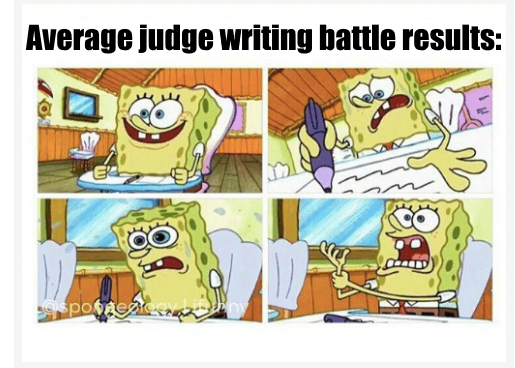During the recent War of Conquest, the parties submitted almost every other battle for review. Moreover, the involved parties even signed a ceasefire party due to their “mutual dissatisfaction” with the judges. This raises the question: are judges the most hated staff in CPA?

To understand the judging system, it is important to go back in time to the origin – nah, not really. If you must know, the closest instance of the current judging departments occurred in 2018. The aftermath of the World War Rewritten included a major judging revamp, which birthed our current system. I would have delved into the history if I did not have any real points to talk about.
Part 1: Reviews
Judges log on to the server at least thirty minutes before the scheduled start time. Failure to arrive on time is deemed tardiness and may negatively affect their performance. During this time, the opposing armies engage in preparations while the judges confer about which rooms to use. This discussion usually takes approximately two minutes.
Subsequently, for the remainder of the allotted hour, the judges have nothing to do but exchange pleasantries with both armies as they await the commencement of the battle. Only after idly passing the first half of their designated hour do they commence the task of analyzing the battle.

Upon reaching a verdict, the judges are then compelled to compose elaborate explanations for their decision. However, even after rendering their judgment, the losing army may challenge the outcome by appealing for a review. This initiates an often unnecessary and time-consuming process that ultimately upholds the original decision.
Reviews are essential in the judging system, particularly in tournament battles or when judges overlook inappropriate tactics that could overturn the result. However, they are generally unnecessary in normal wars. Reviews are more often pushed due to the army losing, rather than any noticeable faults from the judges.
The unfortunate abuse of the review system has caused many judges to hesitate before announcing the results, as army leaders frequently push back vehemently against the nearly irrevocable verdict, unless the judges have a commendable reputation. And when judges start avoiding their battles, these same leaders get annoyed.
Part 2: Draws and Overtime
The pervasive use of reviews in every battle has led to a climate of hesitation and ambivalence amongst judges. Many judges feel that voting for a tie is much safer than taking a decisive stance on the result. This situation became particularly evident in the “tie-tie-tie” outcome in the War of Conquest. With some freedom, novice judges can determine the winner of any battle within thirty minutes.

Can you guess the result of this room?
However, even seasoned judges falter in the face of reviews and unsportsmanlike conduct. This results in the dreaded overtime rooms and unfairness in battles. For instance, judges should be allowed to give an army that does minutely better in the final room of a tied battle the win, rather than proceeding to overtime.
The universal application of the review system has created a messy judging system. Judges should allow reviews only for tournament semi-finals and finals or proven misconduct.
Part 3: Personal Preferences
The subjectivity of judges can significantly influence the outcome of battles. What one judge perceives as a clever formation, another may not appreciate. Consequently, the same army using the same strategy can receive different verdicts in distinct battles.
Take, for instance, the ongoing controversy around big word bubbles and word tactics. Certain armies have won battles owing to their specific ratio of these elements, only to lose the next battle for the same reason. This lack of consistency leads to army leaders pointing fingers at the judges.

A judge mocking both armies in a battle for overusing tactics with special characters
The root cause of this problem lies in the absence of established criteria to evaluate these essential elements. For example, with big word bubbles, there are no precise specifications regarding the number of tactics that should negatively affect an army’s score. Each judge’s subjective interpretation of this number further exacerbates the issue. The current system thus encourages inconsistency, which in turn fuels mutual hatred between judges and leaders.
Even if guidelines for every significant element of a battle were established, potential conflicts could still arise. These guidelines could transform into a rigid formula for winning battles, leaving only the size of the armies undecided. This may result in a stagnant battle mechanism, lacking any creativity and diversity. An optimal solution could be to establish clear rules only for controversial factors present in every battle outcome, striking a balance between the need for guidelines and the risk of stifling innovation.
Conclusion
There is a popular notion that administrators are the most despised among staff members, but judges currently face more frequent and overt reproval. While the power and authority of administrators may draw disdain, the more direct and regular interactions between judges and players create more opportunities for scrutiny and condemnation. It is also important to note that judges do not receive much recognition for their work. Nevertheless, it is essential to acknowledge that the circumstances have improved in recent times. With persistent endeavors from the Head Judges to restructure the system, maybe the judges won’t be hated as much in the days to come.
[…] dissatisfaction over judging, as well as a recent editorial regarding judging being the “most hated job in CPA.” With this in mind, Time Capsule has set out to interview the four current Head Judges. We […]